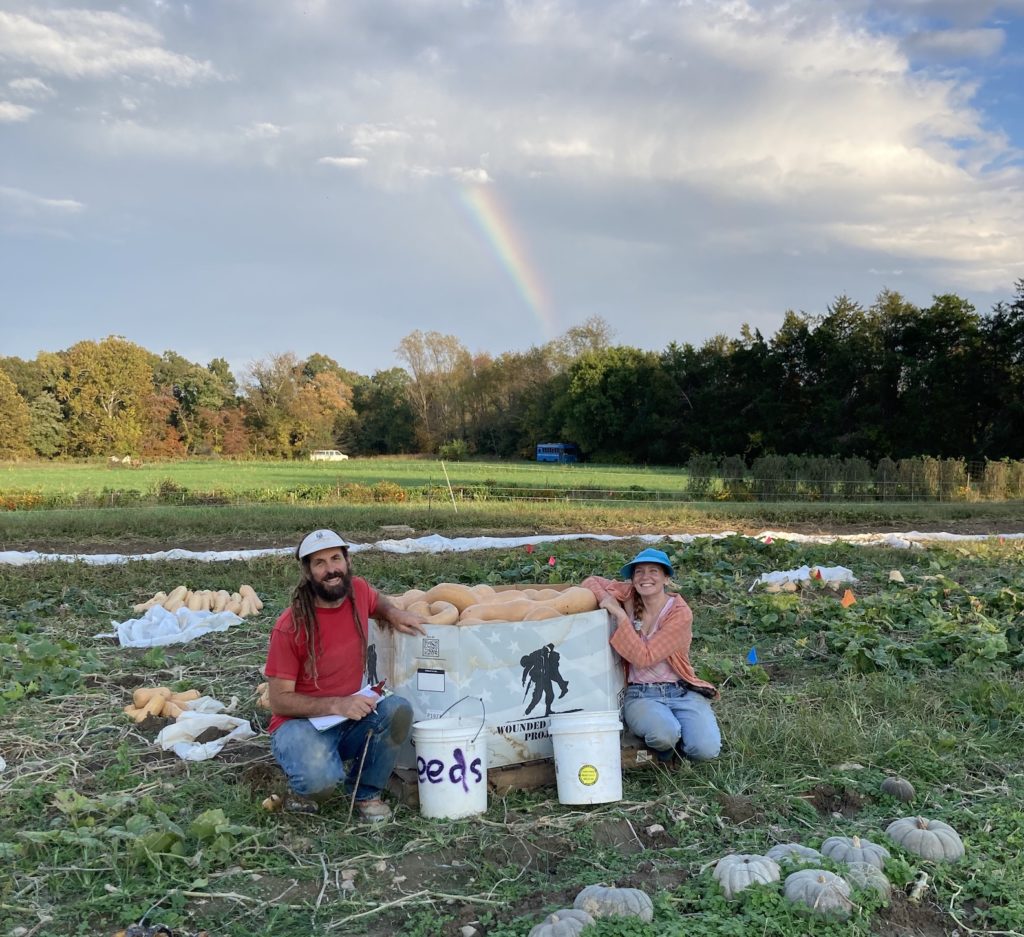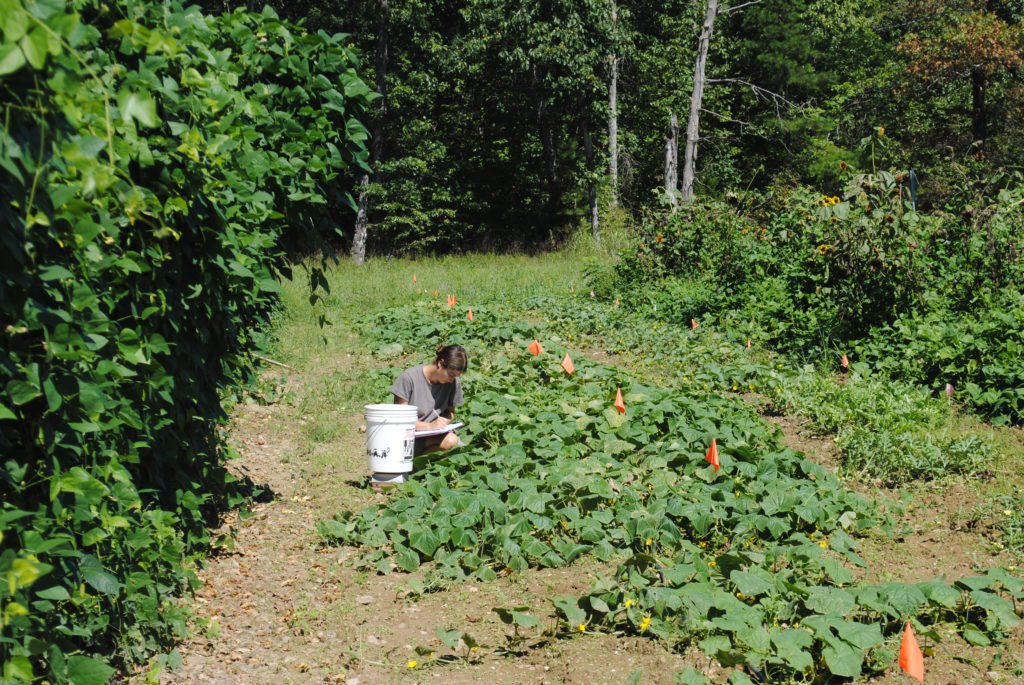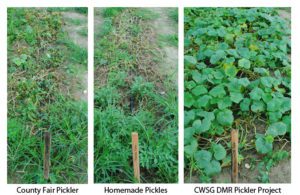Variety trials research and plant breeding are central to a robust seed system, and central to what we do. We are identifying – and developing – varieties that exhibit the best pest and disease resistance for our region, as well as great flavor and productivity.
This page features links and summaries for over 10 years of research work at our farms.
2024 Growing Season Research Summary
2023 Growing Season Research Summary.

Click here for a summary of our 2022 winter squash research and breeding progress.
Our 2023 Winter Newsletter has updates on research and breeding from the 2022 growing season.
The full report from our 2020-2021 butternut squash research project is now available.
2021 RESEARCH AND PLANT BREEDING
Here is an article about our butternut squash breeding work – published in December: https://southern.sare.org/news/butternut-squash-virginia-breeding-sustainable-agriculture/
We’ve released six new varieties this winter! Two butternuts, two cucumbers, a cantaloupe melon and a Halloween pumpkin. Read about them here.
We’re also working on some new melon varieties, derived from crosses between Edisto 47 and Trifecta, and between Edisto 47 and Athena. The goal is excellent fruit quality (flavor, sweetness, small seed cavity & storability) combined with good resistance to both downy mildew and bacterial wilt. In 2021 we selected from F2 plantings of both crosses and are really excited about the potential. We’re also working on a green honeydew melon derived from a Chinese hybrid called “Sun Net.”
2020 RESEARCH AND BREEDING PROJECTS
Winter Squash work in 2020 was funded by a farmer research grant from Southern SARE (Sustainable Agriculture Research and Education. Results coming later this winter. The project included:
-Breeding trials of crosses made between South Anna Butternut and several other varieties (including Chinese Tropical Pumpkin and a Guatemalan Ayote squash)
-Continued intensive selection of South Anna Butternut
-Large and small block variety trials at multiple sites
-Work done by Megan Allen of Care of the Earth Farm in Corryton, Tennessee to develop a new butternut variety from a cross between Waltham Butternut and San Jose Mountain Club, a squash from Costa Rica.

Evaluating the 2020 Cucumber Variety Trial
We continued work with cucumber, trialing multiple downy mildew resistant pickling cucumber lines bred at Cornell University, as well as our own DMR lines. We also did slicer and pickler breeding trials – smaller than in 2019 when we had grant funding from OFRF (see below), but still moving the projects forward. We are excited about the eating quality and productivity over a long window of these lines, as well as resistance to bacterial wilt and downy mildew. We are not quite ready to release these varieties, but we do have seed samples to share in exchange for your feedback!
Other breeding projects:
-Developing a vine borer resistant C. maxima squash from a cross between a Brazilian variety called Moranga Coroa and a variety from Johnny’s called Winter Sweet. This year we grew and selected from the F2 generation. Eating quality is variable still but many of the plants have excellent fruit. We’ve been especially enjoying them fried, with the skin still on. Keeping quality is also excellent, and about 1/3 of the plants had zero vine borer damage.
-Developing a vine borer resistant, downy mildew resistant Halloween pumpkin from a cross between a mexican Tutume squash and a commercial hybrid pumpkin.
-We grew the F1 of a cross between our two favorite cantaloupe melons: Trifecta and Edisto 47. The melons were great, and we’re excited to start selection next year in the F2 generation.
2019
In 2019 CWSG received a second year of funding from Organic Farming Research Foundation for cucumber trialing and breeding work. Read the final 2019 report here! Read the final 2018 report here! In this year’s project we worked with several other Southeast farms to set up remote trials of our downy mildew resistant (DMR) cucumber breeding selections, alongside commercial varieties. We also collaborated with researchers at North Carolina A&T, University of Massachusetts, and Ohio State who trialed our cucumbers, and conducted a breeding trial at our farm.
Pickling Cucumber Breeding Trial, September 5th 2019

In the breeding trial we continued selection with our DMR pickler and slicer breeding populations, recording detailed data (yield, eating quality, disease ratings) on over 300 plants. We are saving seed from the best plants, including self-pollinated fruits and hand-pollinated crosses between standouts.
Stay tuned for more details and data from our 2019 cucumber project!
Also in 2019 we continued to refine South Anna Butternut, growing and evaluating over 100 separately-trained plants. As of mid October we have harvested all the fruits and are starting on eating quality evaluations. Seeds from the plants that have the best combination of flavor, sweetness, texture, productivity, shape, determinacy, downy mildew resistance and keeping quality will make up our stock seed for next year. Here is an interview Edmund did this October about breeding South Anna Butternut. https://osseeds.org/free-the-
Harvesting South Anna Butternut, October 14th, 2019

Here is a presentation about the project from the Carolina Farm Stewardship Association conference in November 2018: CFSA Trials and Breeding Presentation 1
The project included two variety trials, one focused on Downy Mildew and the other on Bacterial Wilt, as well two generations of selection with our pickling cucumber breeding population. We’re aiming for a pickling cucumber that resists both diseases. We started 2018 with F3 seed that we selected in 2017 from a cross between Chinese, Filipino and American varieties, and ended the season with selected F5 seed.
Our F3 DMR pickler seedstock did very well in the downy mildew trial, both in terms of yield and DM resistance! Below is a photo comparison with two other pickling cucumbers, County Fair and Homemade Pickles, taken on September 17th 2018.
The 2018 South Anna Butternut crop held up well to Downy Mildew despite the wet weather. We continued to refine South Anna by selecting from several hundred separately-trained plants. The plants with the best downy mildew resistance, productivity and shape were further screened for eating quality as well.
Here is a post by Organic Seed Alliance about the plant breeding workshop we hosted in September of 2018.
2016
Common Wealth Seed Growers received a SARE grant for winter squash research, selection and breeding work in 2016. Read the final report here: https://projects.sare.org/project-reports/fs16-291/
Here is a slide show about the project that Edmund Frost presented at the Virginia Association for Biological Farming 2017 conference: VABF Squash Tasting 1
2015
Read about CWSG’s 2015 gourd trial here 2015 Gourd Trial. We added several gourd varieties as a result of this trial, and discontinued a few as well.
2014
Twin Oaks Seed Farm received a SARE producer grant for the 2014 growing season to identify downy mildew cucumber, melon and winter squash varieties. The primary goals were to evaluate resistance to Cucurbit Downy Mildew, and to identify resistant seedstocks. Eating quality and productivity were also evaluated. Read the final report here: Identifying and Marketing Quality Open-Pollenated and Organic Cucurbit Seedstocks for Virginia. Please note: you will need to disable your pop-up blocker to be able to read the data sheets on SARE’s website.
